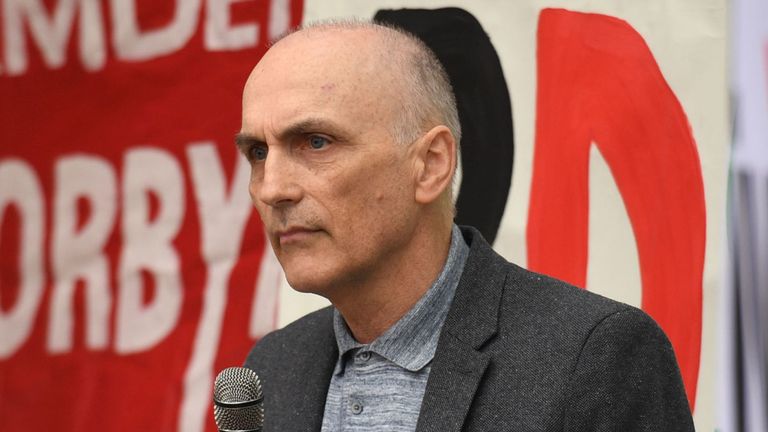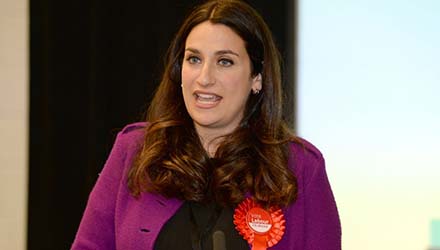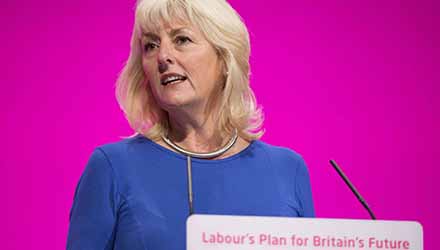Suspending Chris Williamson MP is an outrage, writes Carla Roberts
You might have thought that the retreats and concessions to the right from the Labour leadership could not get any worse, but what happened on February 27 surely takes the biscuit.
Chris Williamson MP was suspended by general secretary Jennie Formby over “remarks about the party’s handling of anti-Semitism”, as the BBC put it. So what exactly did he say? Speaking at a meeting of Sheffield Momentum, he had ventured the opinion that “we have backed off far too much, we have given too much ground, we have been too apologetic”. Labour has been “demonised as a racist, bigoted party”, when, in reality, “we’ve done more to address the scourge of anti-Semitism than any political party”.
If anything, Williamson himself was “too apologetic”. Labour has not been hit by any “scourge of anti-Semitism”: what we have seen is a concerted witch-hunt against Corbyn supporters and the left, in which ‘anti-Semitism’ has been weaponised and equated with anti-Zionism. Several high-profile figures have been accused of anti-Semitism, but in none of their cases has the accusation been upheld. It is true that some clearly anti-Jewish comments from people claiming to be Labour members have featured on social media, but only 12 have been expelled (including a Jewish comrade who simply refused to cooperate with the kangaroo court). Even if we assume that all 12 were actually guilty, why should we describe this as a “scourge”?
If you divide the total Labour membership figure – 540,000 in September 2018 – by 12, you will find that Labour’s so-called anti-Semitism problem is small to the point of being irrelevant. No wonder that actual Labour activists on the ground will tell you that they have never witnessed anti-Semitism or any such thing at Labour meetings or from individual members in conversation.
Yet, despite this, Williamson issued an apology for his comments at Sheffield, saying he had not meant to downplay the “pernicious and cancerous” nature of anti-Semitism. From now on he would be more “considered” in his language, as he wanted to be “an ally” in the fight against it. However, if something is said to be “cancerous”, that means it is liable to spread uncontrollably and may even result in the death of those affected. It is laughable to suggest that Labour has been struck by such a disease.
It is clear that the Labour right has been awaiting its opportunity to attack Chris Williamson, who has been virtually the only Labour MP to condemn the ‘Anti-Zionism equals anti-Semitism’ witch-hunt for what it is. Just the day before all this happened, he had been condemned for booking a room in parliament for the screening of The Witchhunt, the film defending Jackie Walker – a black Jewish activist who has been suspended from Labour for almost three years for totally spurious allegations of anti-Semitism.
He was forced to cancel the booking under pressure from, among others, Jennie Formby. This is regrettable, to say the least. Jeremy Corbyn might recently have defended Chris as “a very good, very effective Labour MP. He’s a very strong anti-racist campaigner. He is not anti-Semitic.”1)The Times February 27 But in general, he has remained criminally silent over the witch-hunt – even though he is, of course, its prime target.
It seems that Williamson was at first told he would not be suspended, but placed under “formal notice of investigation” over some undisclosed “pattern of behaviour”. But within hours that was reversed – following expressions of outrage by the usual suspects, including deputy leader Tom Watson, who said Williamson’s apology was “not good enough”!
Zero tolerance
Meanwhile, Momentum owner Jon Lansman had earlier proudly boasted in a tweet about one of his achievements since his election to the national executive committee in 2018:
Just last Friday we referred 19 out of 35 case reviews to the national constitutional committee, almost all with strong recommendation for expulsion. Of Labour’s 500,000 members perhaps a few hundred are hard-core anti-Semites. If we improve our processes, we can make sure they are kicked out of the party (our emphasis).
Remember, this came just a couple of weeks after we learned from the information provided by Formby that the vast majority of allegations made against members had been false (if not deliberately trumped up). Most of those accused by the right have been cleared by the Labour Party’s disciplinary process3 – which can hardly be described as biased towards the left or even particularly fair.
But, rather than defending all those wrongly accused, Lansman – together with John McDonnell, it seems – is campaigning for more investigations, more punishments and a policy of ‘zero tolerance’. The tens of thousands of vexatious complaints, hundreds of suspensions and investigations and 12 actual expulsions provide evidence of a poisonous anti-democratic culture.
We note that Lansman celebrates the life-long ban of Tommy Robinson from Facebook and Twitter (as if he really needs these to spread his message):
We know Tommy Robinson’s fans will scream that he’s been censored, but our message is clear – hate speech isn’t free speech and inciting people to racist violence should never be tolerated. Not on our streets, and not on our social media. 2)Momentum email February 26
It does not take much to imagine Lansman calling for a ban from social media of those on the left spurting what for him constitutes ‘anti-Semitic’ “hate speech”.
Both McDonnell and Lansman are clearly following the lead of the right on the issue. We note that Tom Watson is not just spearheading a new group of ‘social democratic’ Labour MPs, but has “vowed to take personal charge of anti-Semitism and bullying complaints made by MPs” and will be “monitoring and logging abuse and threats made by members” – effectively creating a parallel disciplinary process. Maybe this one will be less to the liking of McDonnell and Lansman?
John McDonnell said in a recent interview that he wants to “get the message out that if people behave in a way that is construed as anti-Semitic by common standards, they will be dealt with. Full stop. They are not welcome.”
But that is the crux of the matter: what exactly is “anti-Semitic by common standards”? What is anti-Semitic “hate speech” and what is justified criticism of the actions of the state of Israel? This is, as McDonnell and Lansman know all too well, a hotly disputed issue. And one that is constantly evolving under the current scurrilous campaign pursued by the right.
Just take the evolution of the term ‘Zionism’. This is a label chosen by the Zionists themselves to describe their political ideology. Yet we have seen dozens of examples of Labour Party members being investigated simply for their use of the word – often merely in a descriptive fashion. Lansman wants to ban the diminutive form, ‘Zio’, because for him it is an insult.
Even at the recent conference of Labour Against the Witchhunt, the well-informed attendees could not agree on a definition of anti-Semitism: some preferred the definition in the Oxford Dictionary (“Hostility or prejudice to Jews”), while others lobbied for the definition in the Merriam Webster Dictionary, (“Hostility toward or discrimination against Jews as a religious, ethnic, or racial group”), while others thought Brian Klug’s definition the best (“hostility to Jews as Jews”). Jewish Voice for Labour and Free Speech on Israel have produced a ‘Declaration on what is – and what is not – anti-Semitic misconduct’.
Of course, McDonnell and Lansman do not mean any of those perfectly decent and workable definitions. If they did, they would have to stand up and finally put an end to the campaign by the right in the party. Thousands of party members have been suspended and investigated – and not because they show actual “hostility or prejudice” towards Jews. Most complaints are based on (sometimes sloppy) comments made in the heat of an online debate, when somebody, for example, writes ‘Zionists’ when they should say ‘the Israeli government’ – or ‘Jews’ when they should say ‘Zionists’. Or somebody sharing a meme that, on much closer inspection, turns out to be the work of an anti-Semite – does that make the sharer anti-Semitic? How about having your words taken out of context, twisted and rearranged?
These types of accusations make up the vast majority of the complaints against Labour Party members. Hastily written, sometimes based on misconceptions and misinformation and, yes, sometimes based on low-level prejudice. But these instances – which, as can be expected, are increasing proportionally with the growth of the witch-hunt – would best be countered by education through open and transparent debate (and, no, we are not talking about the ‘rehabilitation programmes’ offered by the Zionists of the Jewish Labour Movement or the witch-hunters in Hope not Hate, who have joined in the calls to sack Chris Williamson3)Huffington Post, February 26).
False ‘definition’
How about the reason for Derek Hatton’s suspension from the party, two days after the former Militant member and deputy leader of the Liverpool council was allowed to rejoin? In 2012, during Israel’s ‘Operation Pillar of Defence’, in which Israeli airstrikes killed hundreds of Palestinians in the Gaza strip, he tweeted, clearly outraged: “Jewish people with any sense of humanity need to start speaking out publicly against the ruthless murdering being carried out by Israel!”
We wonder if he is one of the “hard-core anti-Semites” that McDonnell and Lansman want to kick out of the party? Hatton’s comment could have been a bit clumsy, but surely what he meant was that, while everyone should speak out against Israel’s atrocities, such criticism is particularly effective when it is made by those the state of Israel claims to represent. Either way, his tweet clearly does not merit suspension – it seems we are back in the bad old days where members are suspended first before any investigation takes place. Clearly, the party leadership is still trying to appease the right – even though every time they take one step back, the right takes two steps forward.
That is, of course, exactly the point of the so-called ‘definition’ of anti-Semitism produced by the International Holocaust Remembrance Alliance, which was finally adopted by the Labour Party’s NEC last year with all 11 examples (seven of which deal with Israel, not Jews) after much lobbying by Lansman and McDonnell. Some NEC members were all too aware that the examples that come with the ‘definition’ are designed to conflate anti-Zionism with anti-Semitism. Among them, of course, Jeremy Corbyn who – unsuccessfully – tried to add a disclaimer clarifying that criticising Israel was not anti-Semitic.
To make matters worse, the IHRA is anything but a definition. As well as being driven by a pro-Zionist agenda, it is poorly phrased and inaccurate. Labour Against the Witchhunt and other organisations have produced useful analyses of the document, which is – contrary to what we are constantly told – not widely accepted internationally (only 15 countries have – cynically – adopted it). It is designed to legitimise the horrendous actions of the state of Israel against the Palestinians, to silence critics who are pointing to the increasing official racism of the regime and, crucially, to prepare for further military action.
To our knowledge, the IHRA definition has not yet been used to discipline anybody in the Labour Party (it is also not legally binding and could not be used before a court) – but judging by the way Lansman, McDonnell and Formby are going, we would not be surprised if that starts to happen soon.
We call on all democrats, socialists and Marxists in the Labour Party to campaign to reverse the NEC’s decision on the IHRA and to show solidarity with Chris Williamson MP (there are useful model motions on LAW’s website for both).







